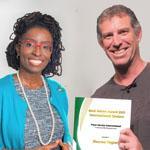
A co-worker who moved to Barbados a couple of months ago, told me about her cousin from overseas who’d recently visited her in Barbados. It was his first time there. Within a day of his arrival, her cousin borrowed her car. My co-worker sat beside him as he drove around the island. They eventually came to a roundabout and my co-worker instructed him to turn left.
“No,” he responded, “we’d better go right.”
My colleague pointed out she was the one who lived here, but he was adamant. He knew where he was going. He’d glanced at the map before they left the house. When it turned out to be the wrong road, he simply said: “I meant to do that.”
As she wrapped up the story, my co-worker smiled and said “he thinks he knows it all.” She shrugged, “but then again, so do I.”
The foolishness of knowledge
Her statement made me think about the foolishness of knowledge. The Merriam-Webster Dictionary defines knowledge as: “information, understanding, or skill that you get from experience or education”, “acquaintance with or understanding of a science, art, or technique”, “apprehending truth or fact through reasoning” and “the fact or condition of being aware of something.”
Knowledge itself isn’t foolish. The foolishness of knowledge comes in when we think we know but we really don’t know that we don’t know. Ignorance masquerading as knowledge is self-delusion.
God has said to trust His Knowledge. The all-knowing, eternal, all-present Creator of all things possesses knowledge the human mind will never be able to fully grasp. Yet He has made us with the ability to download some of this wisdom as we journey through a confusing world. His divine power has given us all things for this life (2 Peter Chapter 1 verse 3). That means every problem we face, the God who has all the answers has already empowered us to know how best to respond.
We can access that knowledge through listening to and yielding to the Holy Spirit. Paul said to the believers in Ephesus:
“I keep asking that the God of our Lord Jesus Christ, the glorious Father,may give you the Spirit of wisdomand revelation, so that you may know him better.I pray that the eyes of your heart may be enlightenedin order that you may know the hope to which he has calledyou, the richesof his glorious inheritancein his holy people, and his incomparably great power for us who believe.” (Ephesians Chapter 1 verses 17 to 19)
The Holy Spirit shows us how to apply knowledge well, which is what wisdom is (1 Corinthians Chapter 2 verses 10 to 13).
Hearing the voice
How do we know it is the Holy Spirit speaking? The more you hear the voice of someone, the more sure you are it’s them when you hear it (Romans Chapter 10 verse 17). Knowledge comes from reading the Word.
We can read a passage from the Bible written millennia ago which is directly relevant to a situation we’re currently going through.
Also, reading the Word opens your eyes about God’s character. Humans can never truly know an infinite God, but we can get a glimpse into the heart and personality of God, as men like Moses did (Psalm 103 verse 7). We can gain knowledge as to how He views a situation, and we can see His Hand in everything. The revelations about Him that will come from spending time with Him in prayer and meditation on His Word, or simply being attuned to his presence, are limitless.
Wisdom appearing foolish
God’s knowledge may not look like knowledge in the eyes of those around you. And he uses ordinary people others may not consider the most learned, or academically accomplished, to do great things:
“For the foolishnessof God is wiser than human wisdom, and the weaknessof God is stronger than human strength. Brothers and sisters, think of what you were when you were called. Not many of you were wiseby human standards; not many were influential; not many were of noble birth.But God chosethe foolish things of the world to shame the wise; God chose the weak things of the world to shame the strong.” (1 Corinthians 1 verses 25 to 27)
And when he says love your enemies, pray for those that curse you, be humble, love, obey, give thanks in times of trial and difficulty, let go of selfishness, overcome evil with good, people may not understand. When he talks about the message of a Saviour King, fully man and fully God who became despised, suffered humiliation and death on a cross so that we could be friends of God, this message seems absurd.
But better to be seen as wise in God’s eyes than to be thought the most knowledgeable by those around you. Follow his path. Navigate using His directions. That way, you’ll avoid wrong turns.

Sharma Taylor is a corporate attorney with a Doctor of Philosophy Degree in Law from Victoria University of Wellington in New Zealand. She won the 2017 Basil Sellers International Young Writers prize in the Press Service International young writer program, the 2019 Tronson Award (International) and the 2021 Basil Sellers award for International Senior Writers. Every day, she loves experiencing the beautiful surprises that God has stored up for her and longs to keep cultivating a servant-heart.